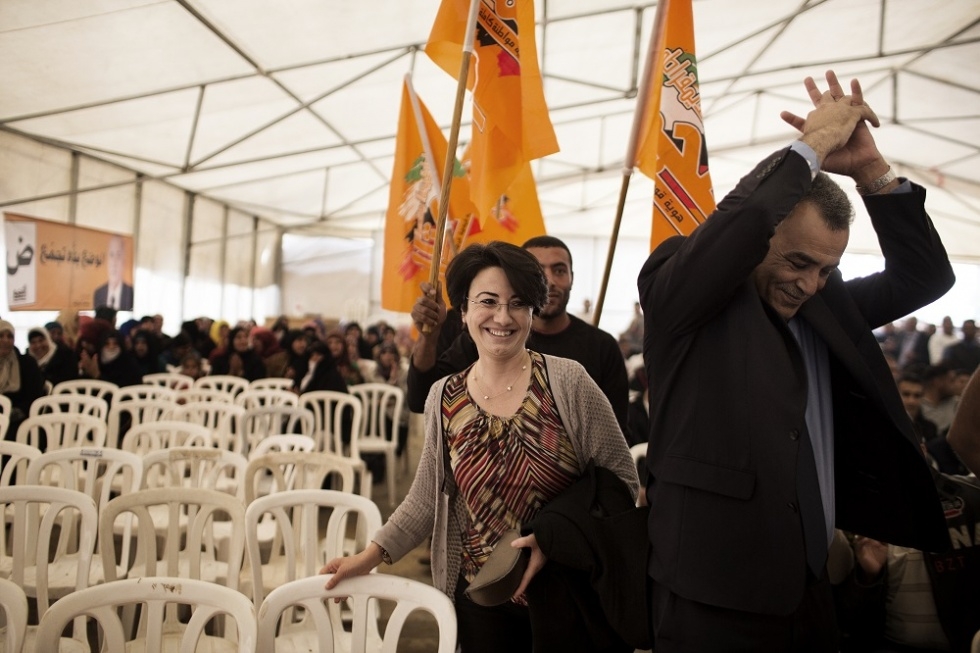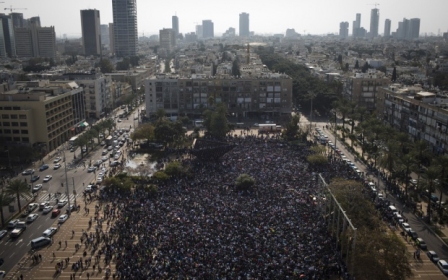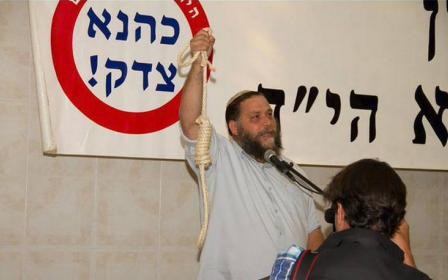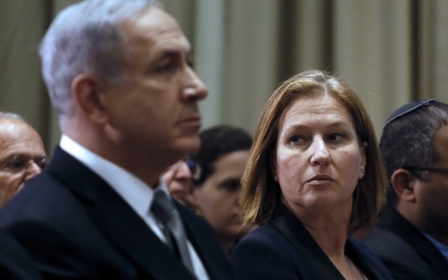ANALYSIS: Israeli election could end in Arab-free Knesset

NAZARETH, Israel - Israel's large Palestinian Arab minority is facing the most crucial, and possibly most dangerous, general election in its history, according to analysts.
Both the survival of Arab political parties in the Israeli parliament and the status of Palestinian citizens - who make up one in five of the population- inside a Jewish state are at stake, said Asad Ghanem, a politics professor at Haifa University.
"Key questions that have been avoided by [Israel's] Jewish and Arab communities for decades are coming sharply into focus for the first time," said Ghanem of the election due on 17 March. The outcome, he added, would determine whether Israel continued down the path towards "fascism" chosen by the current government of Benjamin Netanyahu.
The background to the election, Ghanem noted, was a political crisis triggered by Netanyahu's recent efforts to introduce legislation defining Israel as the nation-state of the Jewish people.
The bill, which is likely to be revived if, as expected, Netanyahu and the right win a majority of seats, is intended to anchor legislation in Jewish tradition and religion, end the status of Arabic as an official language, and further tie the hands of the Supreme Court in protecting the rights of the Palestinian minority.
The legislation breaks with the traditional and vaguer formulation of a "Jewish state" preferred by Israel's first prime minister, David Ben Gurion. Like most Israeli politicians on today's left and centre, Ben Gurion wanted to avoid defining too precisely what such a state entailed, fearing that it would exacerbate social divisions and fuel opposition abroad, said Ghanem.
"The Jewish population are being forced to openly debate the question of the status of Arab citizens," he told Middle East Eye. "It is in our interests that they do so. We know what the right thinks, but the left has preferred to ignore the discussion, sticking to the 'safer' subject of the occupation."
Small parties targeted
Netanyahu's right-wing government has also succeeded in raising the electoral threshold for the next parliament, passing a law in March that raised it from 2 per cent to 3.25 per cent. The move, officially justified on the grounds it would end the proliferation of small, narrow-interest parties, is supposed to lead to more stable coalition governments.
But intentionally or not, the measure also means that, unless they forge alliances, the three small Arab-dominated parties in the current Knesset - Balad, United Arab List and Hadash - may fail to win a single seat between them.
Without their presence, said Ghanem, the Zionist centre and left parties in the Knesset had no hope of ousting Netanyahu and the right.
The Arab parties currently have 11 seats in the 120-member chamber.
Haneen Zoabi, a Knesset member for the nationalist Balad party, said a single, unified list could win an extra four or five seats, adding weight to the minority's voice in parliament.
"The current divisions are unhealthy and the public does not understand why we do not unite," she told Middle East Eye. "We are facing an ever harsher, racist environment and we need a common strategy if we are to struggle for equality."
Unity is no simple task given ideological differences between the factions and long-running personality clashes.
The traditional party divisions are no longer considered viable. The raised threshold and a dramatic fall in turnout by Palestinian voters in recent elections mean that unity has become a matter of "survival", said Awad Abdel Fattah, Balad's secretary general.
The parties' ideological differences - they largely identify as Communist, Islamic and nationalist - have prevented them from reaching an early agreement.
Ideological splits
The communists and nationalists are secular, and oppose in particular the Islamic movement's stance on women's rights. But the Communists reject the nationalists and Islamic Movement's support for educational and cultural autonomy for the Palestinian minority.
Instead, the communists characterise themselves as a uniquely joint Jewish-Arab party, though there are few Jewish members, and highlight cooperation between the two groups.
Added to the mix is the effectively one-man party of Ahmed Tibi, a former adviser to Palestinian leader Yasser Arafat. Tibi, who has entered the Knesset by making temporary alliances with the Communist and Islamic parties in earlier elections, was the choice of nearly half of the Palestinian citizens polled this month to lead a unified list.
Further worrying the parties has been the dramatic drop in turnout among Palestinian citizens in recent elections, down to barely more than half of potential voters in the last two ballots.
That is attributed in part to growing dissatisfaction with the parties squabbling, in part to the popularity of a northern wing of the Islamic Movement which refuses to stand for the Knesset, and in part to an organised boycott by secular left-wing groups.
But despite these various pressures, the parties are reported to be struggling to find a way to unite.
According to Hana Swaid, a Knesset member from the Communist party, known as Hadash, an agreement on either one or two lists could emerge over the next few weeks.
He believes the most likely scenario is that Hadash will eventually insist on two lists, allying with Tibi, and leave the nationalists of Balad and the Islamic faction to work together.
Sectarianism intensifying
"There is opposition from different elements in the party," Swaid said.
"Some want us to remain identifiably secular and refuse an alliance with the Islamic Movement. Others, especially the Jewish members, feel the party must not lose its Jewish-Arab character."
But Swaid conceded that the failure to agree on one list might intensify calls for a boycott. "I hear lots of people saying it's either a single list or we won't vote. They are fed up with divisions and want to punish us. The parties are aware of that danger."
Zoabi said the central issues that divided the parties were not relevant to their work in the Knesset. "Women's rights are very important, but the Knesset is not the right arena for us as a Palestinian minority to deal with this issue. This is an internal debate we should be having in our own political institutions, in the Arab media, in our schools."
Abdel Fattah warned that unity was also vital to diminish sectarianism and internal feuding among the Palestinian minority, heightened by the Netanyahu government's recent efforts to try to recruit Christian Palestinians to the army.
"If the secular and Islamic parties are on separate lists, it will simply play into the hands of the right. We must show leadership and strengthen the social fabric so that we can struggle more effectively for our national and civil rights."
Ali Zbeidat, a boycott supporter and columnist with the Hadith al-Nass newspaper, said: "The reality is that there is no unity. Even if they create one list, it will be only to save their seats. But nothing good is going to come from our participation in the Knesset."
He dismissed suggestions that a strong showing by the Arab parties might offer political benefits. Some have argued that it would strengthen the centre-left block, allowing the recently allied parties of Labour Party's Yitzhak Herzog and Hatnuah's Tzipi Livni to form a government that might for the first time in Israel's history include Arab parties.
"The [Arab] parties don't even dare to imagine being invited into such a government," said Zbeidat. "They know even the Zionist left would never agree to sit alongside them."
Arab MKs 'fig leaf'
Neither did Zbeidat think there was anything to gain from the Arab parties supporting a centre-left government from outside the coalition, as happened during Yitzhak Rabin's government in the early 1990s. Rabin relied on the minority's support to pass legislation sanctioning the Oslo accords.
"When it comes to their attitude towards us as a Palestinian minority, there is no difference between the right of Netanyahu and Livni and Herzog," Zbeidat said.
Salman Masalha, a columnist with the daily Haaretz newspaper, concurred: "The Arab MKs [Knesset members] merely serve as a fig leaf that covers the nakedness of Israeli apartheid. Arab citizens should boycott the election."
However, according to Ghanem, Arab voters may be driven to turn out not by enthusiasm for either the Knesset or the Arab parties but by growing fears about the threat from the right wing. "The public are very worried about where Israel is heading. That could reverse the trend towards a boycott."
A further potential complication for a united list is posed by the central elections committee (CEC), a body dominated by the main Zionist factions. It has the power to ban both party lists and individual candidates.
In recent elections it has targeted the Islamic and Balad parties and Balad's Knesset member Zoabi. However, the CEC's decisions have been overturned on appeal to the Supreme Court, if sometimes narrowly.
Zoabi is expecting to be singled out again. The Knesset has already imposed a six-month suspension - the longest in its history - for her refusal during a radio interview in the summer to refer to the kidnappers of three Israeli settler youths as terrorists. The three were later found killed.
Court's 'political message'
In a ruling this month that has concerned observers, the Supreme Court upheld the suspension after the judges appeared to ignore the legal issues and instead made pointed remarks against Zoabi's political views.
"The judges wanted to send out a political message and forgot that their duty is to uphold the law and protect freedom of expression and the rights of minorities," Zoabi said.
The court's reluctance to come to Zoabi's aid may set an ominous precedent if the CEC bans her or other candidates before the election.
Such a move could also help to unravel any alliances between the parties.
Majd Kayyal, a journalist and political independent, said it was time to end the distractions of arguing for united lists or boycotts. "What we lack is a strategy of struggle. Israel's parliament and its institutions, whether the courts or media, are not places we can effect change that will help us."
Kayyal said it was time to launch a more dynamic struggle, through nurturing youth movements and adopting new forms of popular mobilisation and civil disobedience.
Others argue less ambitiously that it is time to reorganise the minority's main political institution, the Follow-Up Committee (FUC), which comprises leaders from all the parties but is dominated by the mayors of the largest communities.
Israel has refused to recognise the body and it has been largely paralysed by the same ideological and personal disputes that have affected the Arab Knesset factions.
Swaid, of Hadash, said: "The FUC has been progressively losing status. Everyone now questions its credibility."
Abdel Fattah, of Balad, said he was keen to see the FUC hold elections to its main posts, gradually making it less dependent on the politics of local families and become effectively a parliament for the Palestinian minority.
That would be certain to provoke the Israeli authorities' wrath. But Abdel Fattah said strengthening the minority's institutions had to be the top priority. ""We must empower our community, and give it the tools to fight more effectively against the racist climate in Israel and deal with our social, economic and cultural problems."
New MEE newsletter: Jerusalem Dispatch
Sign up to get the latest insights and analysis on Israel-Palestine, alongside Turkey Unpacked and other MEE newsletters
Middle East Eye delivers independent and unrivalled coverage and analysis of the Middle East, North Africa and beyond. To learn more about republishing this content and the associated fees, please fill out this form. More about MEE can be found here.




